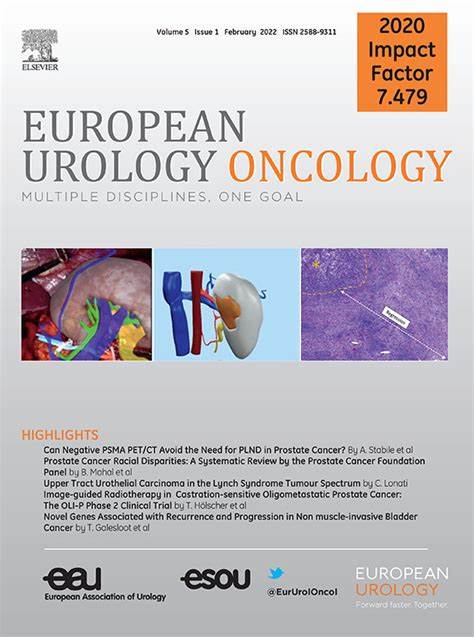治疗非肌层浸润性膀胱癌的新型给药系统和药物治疗方法。
IF 8.3
1区 医学
Q1 ONCOLOGY
引用次数: 0
摘要
背景和目的:非肌层浸润性膀胱癌(NMIBC)患者的治疗方案传统上仅限于膀胱内免疫疗法或化疗。近年来,有相当多的新方案得到了研究。我们的目的是回顾新疗法(已报道或正在研究的结果)对 NMIBC 患者的疗效和毒性:我们评估了各种新型治疗方案的疗效,检查了不同情况下的关键终点,包括复发、病情进展、总生存期、疾病特异性生存期和完全应答。我们确定了每种方案的主要优势和局限性。安全性主要根据≥3级不良事件的发生率进行评估。我们的调查侧重于过去5年内发表的英文科学文章和大会摘要中的证据:迄今为止,pembrolizumab、nadofaragene firadenovec以及卡介苗与N-803的联合用药已获得美国食品和药物管理局批准,用于治疗对卡介苗无反应的膀胱原位癌(伴有或不伴有乳头状肿瘤)。五项 3 期试验正在招募卡介苗无效的高危 NMIBC 患者。对于中度风险的 NMIBC 患者,人们越来越关注消融而非辅助治疗方法:新型药物和设备辅助给药系统即将改变 NMIBC 的治疗方法。与全身疗法相比,新型膀胱内疗法似乎具有相同的疗效,但不良反应较少。患者总结:我们回顾了非肌层浸润性膀胱癌的新疗法选择。迄今为止,已有两种药物(pembrolizumab 和 nadofaragene firadenovec)获得批准。正在进行的试验正在评估将药物溶液直接送入膀胱的方法。与静脉注射免疫疗法相比,这种途径似乎具有相似的疗效和较少的副作用。本文章由计算机程序翻译,如有差异,请以英文原文为准。
Novel Delivery Systems and Pharmacotherapeutic Approaches for the Treatment of Non–muscle-invasive Bladder Cancer
Background and objective
Therapeutic options for patients with non–muscle-invasive bladder cancer (NMIBC) have traditionally been limited to intravesical immunotherapy or chemotherapy. A considerable number of new options have been investigated in recent years. Our aim was to review the efficacy and toxicity of novel therapeutic options (results already reported or currently under investigation) for patients with NMIBC.
Methods
We assessed the efficacy of various novel therapeutic options by examining key endpoints in diverse settings, including recurrence, progression, overall survival, disease-specific survival, and complete response. We identified the principal advantages and limitations for each option. Safety was predominantly evaluated as the incidence of grade ≥3 adverse events. Our investigation focused on evidence from scientific articles and congress abstracts published in English within the past 5 yr.
Key findings and limitations
To date, pembrolizumab, nadofaragene firadenovec, and the combination of BCG with N-803 have received US Food and Drug administration approval for the treatment of BCG-unresponsive carcinoma in situ of the bladder (with or without papillary tumours). Five phase 3 trials are recruiting BCG-naïve patients with high-risk NMIBC. There is increasing interest in an ablative rather than an adjuvant approach for patients with intermediate-risk NMIBC.
Conclusions and clinical implications
Novel drugs and device-assisted drug delivery systems are on the verge of changing the treatment of NMIBC. Novel intravesical options seem to have the same efficacy with fewer adverse events in comparison to systemic therapies.
Patient summary
We reviewed new therapy options for non–muscle-invasive bladder cancer. Two agents (pembrolizumab and nadofaragene firadenovec) have been approved to date. Ongoing trials are assessing direct delivery of drugs in solution into the bladder. This route seems to have similar efficacy and fewer side effects than intravenous immunotherapy.
求助全文
通过发布文献求助,成功后即可免费获取论文全文。
去求助
来源期刊

European urology oncology
Multiple-
CiteScore
15.50
自引率
2.40%
发文量
128
审稿时长
20 days
期刊介绍:
Journal Name: European Urology Oncology
Affiliation: Official Journal of the European Association of Urology
Focus:
First official publication of the EAU fully devoted to the study of genitourinary malignancies
Aims to deliver high-quality research
Content:
Includes original articles, opinion piece editorials, and invited reviews
Covers clinical, basic, and translational research
Publication Frequency: Six times a year in electronic format
 求助内容:
求助内容: 应助结果提醒方式:
应助结果提醒方式:


